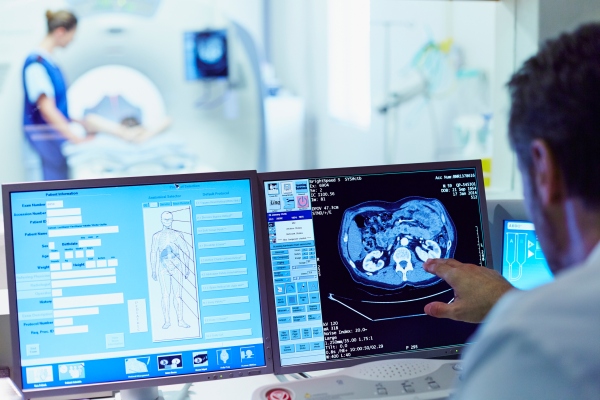Verana Health, a company focused on collecting and organizing troves of medical data, announced a $150 million Series E funding round on Friday. This round comes as the company sets its sights on new types of medical data, invests in organizing traditionally messy forms of information (like physician notes) and aims to extract more usable insights from Electronic Health Records (EHRs).
Verana Health organizes and analyzes electronic health record systems run by three professional organizations: The American Academy of Ophthalmology, The American Academy of Neurology and The American Urological Association. Then, it delivers insight back to practitioners, researchers and life sciences companies. Since its founding in 2018, Verana has become an exclusive data management partner for these professional networks, CEO Sujay Jadhav tells TC.
This current round was led by Johnson & Johnson Innovation and Novo Growth. Existing investors GV (formerly Google Ventures), Casdin Capital and Brook Byers joined the round. New investors include Merck Global Health Innovation Fund, THVC and Breyer Capital.
At the moment, Verana focuses on three major disease areas: ophthalmology, neurology and urology. From there, says Jadhav, Verana provides two pillar products. There’s VeraQ, a “population health engine” encompassing 90 million patients and data spanning seven years, and Qdata, which can link existing data with information from other sources (like insurance claims or medical imaging, more on that later), and provide data sets designed for specific, observational studies.
A fair question to ask of any company looking to provide data-driven insights is: What insights are you providing, exactly? Jadhav provides a few examples.
For instance, the company recently worked with a startup looking to conduct a study on a rare disease not typically captured in ICD-10 billing codes. Verana used natural language processing and manual curation to scan through patient symptoms and procedure history to help identify clinics that might have enough patients with the condition to participate.
On the commercial side of things, another client has used Verana to monitor the post-approval safety and uptake of medical products. Verana helped by analyzing treatment patterns and the demographics of who used the product, looking for safety signals.
Whenever health records are in the picture patient privacy is paramount. Jadhav notes that all patient information is de-identified. “We have a very clear delineation internally. So, 27 people have access to identifiable data, we then de-identify it and whatever we provide to the pharma sector etc. is always de-identified as well,” he said.
De-identified health records are already used to conduct research. EHR analysis, for instance, has facilitated studies on the real-world safety and effectiveness of COVID-19 vaccines extremely quickly. However, experts have also raised concerns that de-identified data could be “re-identified” through a combination of machine learning or combination with other data sets. For instance, a 2018 study in “JAMA Health Policy” argued that this was possible with physical activity data.
Jadhav says that patients can opt-out of data sharing at any point in the process. Though, the most straightforward approach seems to be at the doctor’s office level. For instance, you can ask your ophthalmologist, in writing, to not share EHR data with IRIS (the data set provided by the American Academy of Ophthalmology), if you choose.
At the moment, Verana’s data set is largely centered around these patient registries. However, the company is already investing in both gleaning more from these records, and integrating other types of data.
For instance, Verana is using natural language processing techniques to extract themes from physician notes that don’t fit into most data structures. (Keep in mind de-identifying textual data in EHR records is an area of active reach in and of itself.) But for certain disease areas, Jadhav notes that these physician notes are a big untapped resource:
“In certain therapeutic areas, such as urology, we are finding that there is some structured data there. [But] a lot of the value is around unstructured data. More specifically around physician notes.”
The company has also integrated insurance claims data, and has developed a technique to integrate imaging data. For instance, the company published an abstract on an algorithm that was able to match IRIS EHRs and imaging data with 83% accuracy.
With this current round Verana is aiming to “fuel current growth” using their current business model, per Jadhav. But it also has some specific plans laid out. The company aims to enhance the quality of analysis they can already provide, scale-up clinical trial insights, as well as fund natural language processing projects.
This round brings the company’s total funding to $280 million.









